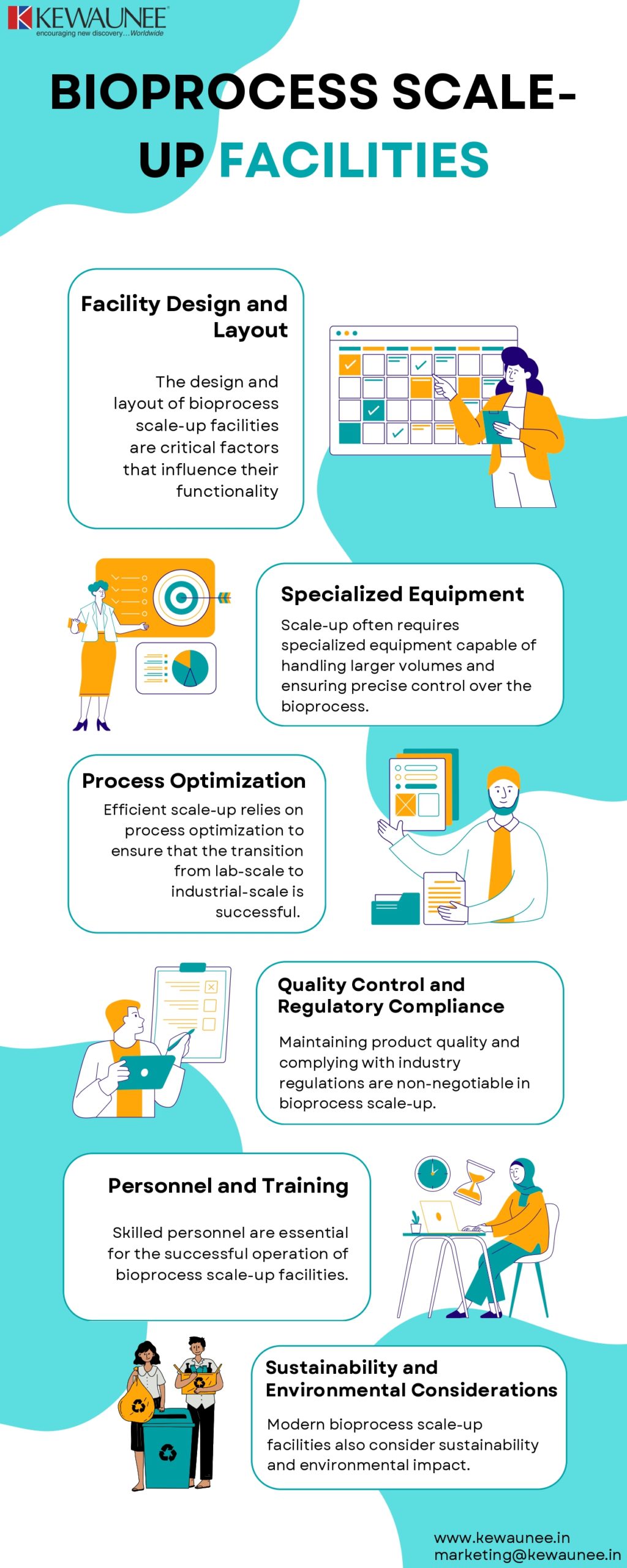Bioprocess Scale-Up Facilities
Bioprocess scale-up facilities play a pivotal role in the world of biotechnology. They serve as the critical link between laboratory-scale experiments and large-scale commercial production.
In this blog, we will explore the significance of these facilities, the key considerations in their design and operation, and the crucial role they play in the biotech industry.
1. The Significance of Bioprocess Scale-Up Facilities
Bioprocess scale-up facilities are the launchpad for biotechnological innovations. They provide the means to transition from promising laboratory discoveries to full-scale production that can meet market demands.
Here’s why these facilities are so vital:
Commercialization
One of the primary objectives of bioprocess scale-up facilities is to enable the commercialization of biotech products. This involves taking a concept that shows promise in the lab and developing it into a product that can be manufactured at a scale suitable for the market.
Production Optimization
Efficiency and cost-effectiveness are paramount in large-scale bioprocessing. These facilities aim to optimize production processes to ensure that resources are used efficiently, minimizing waste and reducing production costs.
Quality Assurance
Maintaining product quality and consistency is a fundamental goal. Bioprocess scale-up facilities are designed to adhere to strict quality control measures to ensure that the final product meets the required specifications and regulatory standards.
2. Facility Design and Layout
The design and layout of bioprocess scale-up facilities are critical factors that influence their functionality. Several key considerations are considered:
Zoning
To prevent cross-contamination and ensure the integrity of different processes, these facilities are often divided into zones. Each zone may have specific air handling and cleanliness requirements to maintain aseptic conditions.
Cleanroom Design
Cleanrooms are essential components of bioprocess scale-up facilities. They are designed to provide a controlled environment with low levels of airborne particles and contaminants. Maintaining sterility is vital, especially in biopharmaceutical manufacturing.
Flexibility
Bioprocesses can vary significantly from one product to another. Facilities need to be adaptable and flexible to accommodate different processes and production needs. Modular designs can be particularly useful in this regard.
Compliance
Bioprocess scale-up facilities must meet regulatory requirements, including Good Manufacturing Practices (GMP). Compliance with these standards is crucial to ensure the safety and quality of the products manufactured.
3. Specialized Equipment
Scale-up often requires specialized equipment capable of handling larger volumes and ensuring precise control over the bioprocess. Here are some key pieces of equipment used in these facilities:
Bioreactors
Bioreactors are essential for the growth of microorganisms or cells used in bioprocessing. In a scale-up setting, these bioreactors are larger and more sophisticated, allowing for the production of greater quantities of biomolecules.
Fermentation Tanks
Fermentation tanks are used for microbial fermentation processes. Scaling up involves the use of larger tanks to accommodate increased production volumes.
Downstream Processing Equipment
Downstream processing involves the purification and separation of the desired product from the bioprocess mixture. Scaling up these processes requires larger and more efficient equipment.
Analytical Instruments
Advanced analytical instruments are employed for monitoring and quality control. These instruments provide real-time data on the progress of the bioprocess and the quality of the final product.
4. Process Optimization
Efficient scale-up relies on process optimization to ensure that the transition from lab-scale to industrial-scale is successful. Several strategies are employed in this regard:
Identifying Critical Parameters
Not all process parameters are equally important. Identifying and focusing on critical parameters that significantly impact the process’s outcome is essential for successful scale-up.
Optimize Conditions
Optimizing conditions involves fine-tuning various factors such as temperature, pH, and agitation to maximize yield and maintain product quality during scale-up.
Scaling Principles
Scaling principles, such as geometric similarity and the Reynolds number, are applied to ensure that the scaled-up process behaves similarly to the laboratory-scale process.
5. Quality Control and Regulatory Compliance
Maintaining product quality and complying with industry regulations are non-negotiable in bioprocess scale-up. Here are some key aspects of quality control:
Quality Control
Rigorous testing and analysis are conducted at various stages of the bioprocess to ensure that the product meets specifications. This includes monitoring parameters like purity, yield, and potency.
Documentation
Comprehensive documentation is maintained throughout the scale-up process. This documentation is critical for traceability and regulatory compliance.
Regulatory Oversight
Bioprocess scale-up facilities must adhere to a range of regulatory requirements, including safety, environmental impact, and product quality. Compliance with Good Manufacturing Practices (GMP) is often mandatory.
Validation
The scale-up process itself must be validated to ensure that it consistently produces the desired product meeting specified quality criteria.
6. Personnel and Training
Skilled personnel are essential for the successful operation of bioprocess scale-up facilities. Here’s what’s involved:
Training
Facilities provide specialized training to ensure that staff are competent in the operation of equipment, adherence to safety protocols, and compliance with regulatory requirements.
Expertise
Hiring professionals with expertise in bioprocess engineering, microbiology, and related fields is crucial. Their knowledge and experience are invaluable in navigating the challenges of scale-up.
Safety
Ensuring that workers understand and follow safety protocols is paramount. Bioprocess scale-up often involves handling potentially hazardous materials, and safety is a top priority.
7. Sustainability and Environmental Considerations
Modern bioprocess scale-up facilities also consider sustainability and environmental impact. Strategies include:
Green Technologies
Using environmentally friendly equipment and processes that minimize energy consumption and waste generation.
Waste Management
Implementing proper waste disposal and recycling practices to minimize the environmental footprint of bioprocessing operations.
Energy Efficiency
Employing energy-efficient systems and technologies to reduce the facility’s overall energy consumption.
Summary
Bioprocess scale-up facilities are the linchpin that enables biotechnology innovations to become commercial realities. Their design, equipment, optimization, quality control, and regulatory compliance are all integral to this process. As the biotechnology field continues to advance, these facilities will play a central role in bringing innovative bioproducts to the global market.
Comments are closed.











